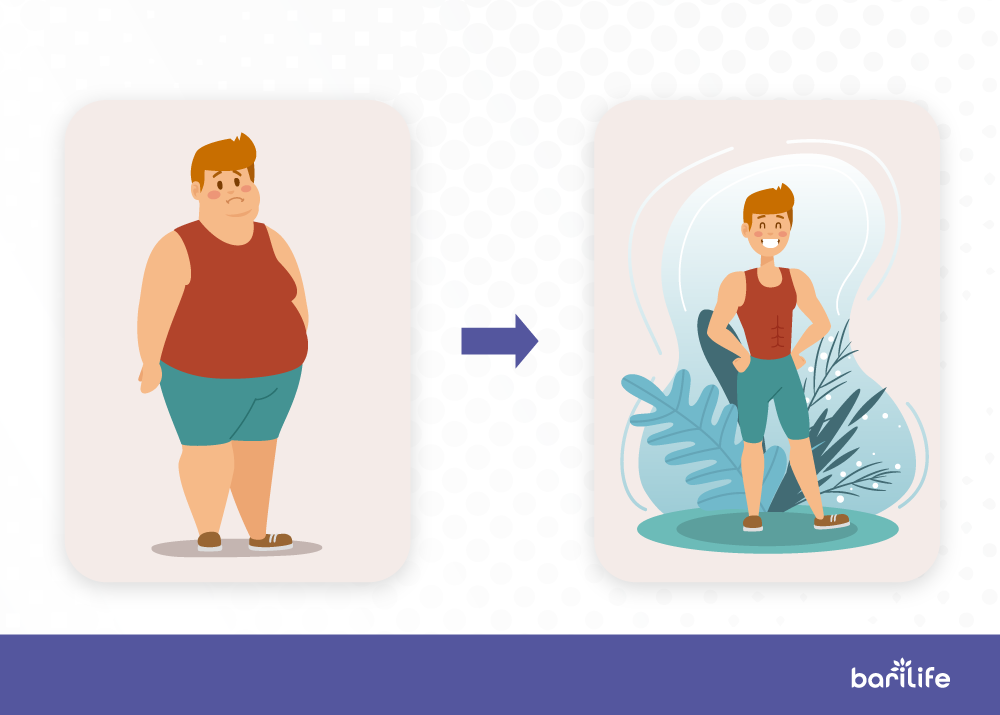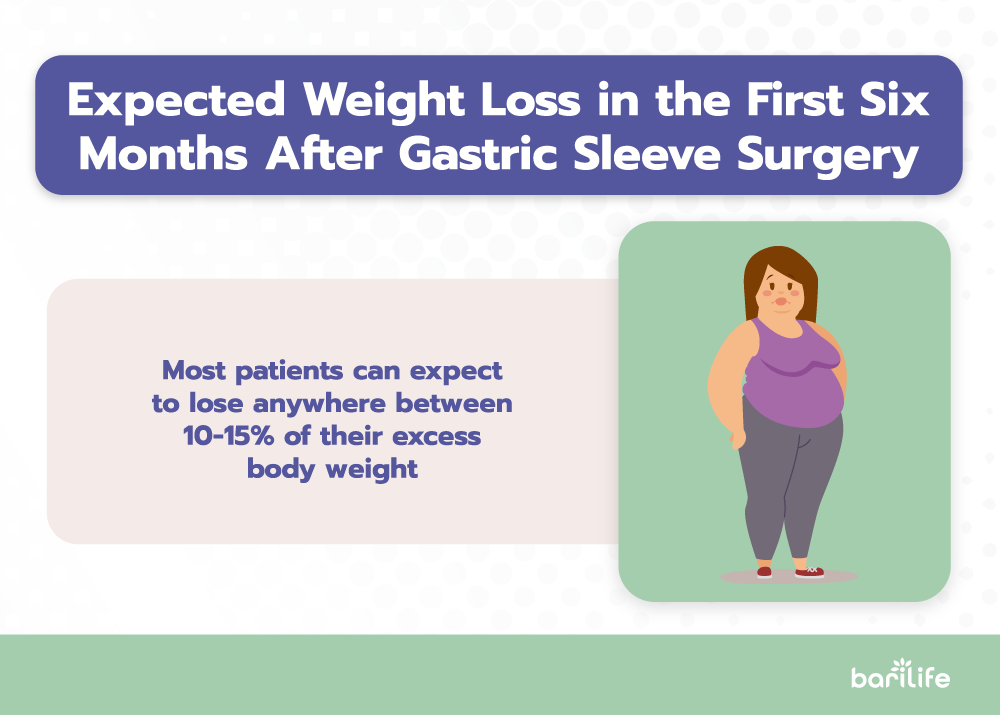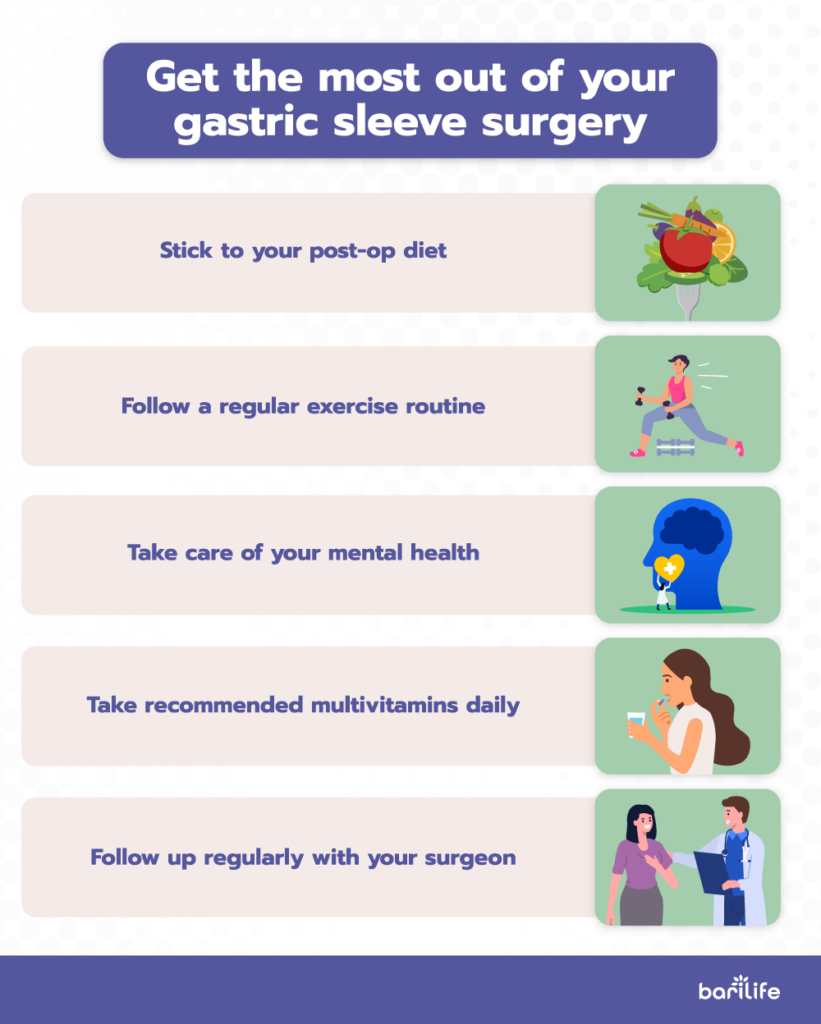Gastric sleeve is a commonly performed bariatric surgery used to help people lose weight when other conventional methods such as diet and exercise have failed. Whether you’re considering gastric sleeve surgery or have already had it, you’re probably wondering how much weight you can expect to lose.
After gastric sleeve, many patients maintain significant weight loss long-term. Six months after gastric sleeve surgery is an important milestone, and if everything has gone as planned, you can expect to lose a substantial amount of weight by this time.
Keep reading to learn more about how much weight you can expect to lose in 6 months after gastric sleeve surgery, and how to get the best results.

What is gastric sleeve surgery?
The gastric sleeve, or laparoscopic sleeve gastrectomy, is a bariatric surgery in which a portion of the stomach is removed, leaving a small pouch, or “sleeve” as the remaining portion of the stomach. This weight loss surgery decreases the size of the stomach and has proven to be safe and beneficial for long-term weight loss and maintenance.
There is no bowel bypass or foreign implant required. Gastric sleeve surgery helps decrease appetite and supports weight loss by decreasing the amount of food the stomach can hold and altering the stomach’s gut hormones that regulate appetite.
Gastric sleeve surgery is a recommended treatment for people with a body mass index (BMI) of 40 or higher. It is also recommended for people with a BMI of 35 or greater who have a qualifying chronic health condition.
During surgery, one large or several small incisions are made in your abdomen. Through these incisions, your surgeon will remove about 80% of your stomach. The portion remaining resembles a narrow sleeve, which is then stapled together to ensure there is no leakage. Since a portion of your stomach is permanently removed, gastric sleeve surgery is not reversible.
Percent excess weight loss
Percent excess weight loss (%EWL) is used to determine overall weight loss in most research studies. This percentage allows researchers to compare one patient’s weight loss to another’s and develop statistics for generally expected weight loss.
Percent excess weight loss is calculated by subtracting one’s ideal body weight from their pre-surgery weight. This value is their excess body weight. Any weight loss is expressed in a percentage of excess weight loss.
If you have an excess body weight of 100 lbs and you lose 50 lbs, your percent excess weight loss is 50%. You can learn more about %EWL here.
People who have gastric sleeve surgery can expect to lose about 70% of their excess weight.
Gastric sleeve results after one month
One month after gastric sleeve surgery, most patients can expect to lose anywhere between 10-15% of their excess body weight. For most, this equals about 2-4 lbs per week. Your total weight loss during the first month might be between 8 and 16 pounds. You can expect to continue this rate of weight loss monthly until around 6 months.
Each patient’s weight loss timeline is different. These guidelines are based on average weight loss from research. Don’t feel discouraged if you haven’t lost this exact amount after 1 month.

Gastric sleeve results after 6 months
Whether you’re considering gastric bypass or you’re approaching the 6-month mark after your surgery, you may be excitedly wondering how much weight you can lose after 6 months. Several studies reveal that patients undergoing gastric sleeve surgery can expect to lose anywhere between 50-70% EWL 6 months after the procedure.
One study showed the average %EWL to be 71% at 6 months, while another study found the average to be 52.8% at 6 months. Finally, a comprehensive review of several research studies on gastric sleeve results determined the average %EWL in 6 months to be 50.6%.
Weight loss typically begins to slow around the 6-month mark. Your gastric sleeve results will be largely determined by your adherence to lifestyle changes recommended by your surgeon, so be sure to remain consistent with diet and exercise as time goes on.
Get the most out of your gastric sleeve surgery
There are several things you can do to ensure you get the best results after gastric sleeve surgery.

Stick to your post-op diet
Always follow the prescribed diet guidelines after surgery to prevent stretching your stomach or any other complications. Only advance to the next diet stage according to your doctor’s recommendations.
Eat foods that are rich in lean protein, including eggs, fish, tofu, chicken, and yogurt. Aim for at least 75 grams of protein a day for men and 60 grams for women, unless otherwise specified by your surgeon or dietitian.
You can decrease your calorie intake by reducing portion sizes and avoiding snacks/grazing between meals. Instead, eat smaller, more frequent meals and avoid foods that are high in sugar and fat, as well as caloric beverages.
Follow a regular exercise routine
After your initial recovery, you might find it difficult to get into an exercise routine. Once you are cleared by your surgeon, it is beneficial to incorporate both cardio and strength exercises into your routine. If you’re not sure where to start, here are some guidelines for exercising after bariatric surgery.
You should do a minimum of 150 minutes of moderate-intensity exercise per week. To increase weight loss, participate in 30 minutes of low-intensity exercise daily (walking, biking, yoga), and 3 days of muscle-strengthening activity per week.
If you are following your exercise routine and still have slow weight loss after gastric sleeve surgery, consider changing your routine. Small changes can target different muscle groups and increase weight loss.
Take care of your mental health
While diet and exercise are important for weight loss, so is taking care of your mental health. Evidence suggests that poor mental health may contribute to weight-loss plateaus in bariatric patients. Body image, stress, sleep, and other factors can impact your mental health. It’s important to prioritize emotional health and have a good support system.
If you don’t have a support system, consider cognitive behavioral therapy (CBT). CBT helps improve mental health and reduce potential weight regain after bariatric surgery.
Take recommended multivitamins daily
Gastric sleeve surgery causes several significant changes to metabolism and digestion. Taking your vitamins and supplements as prescribed by your doctor is key to successful weight loss and good health. Bari Life offers a variety of vitamins and supplements specifically designed for post-bariatric surgery patients.
Follow up regularly with your surgeon
You should follow up with your surgeon frequently after gastric sleeve surgery. Your doctor can help you create a weight loss chart to set goals and track progress based on your excess body weight. Follow-ups allow you and your surgeon to address any slows in weight loss and make changes as needed.
Takeaway
The decision to undergo gastric sleeve surgery is a big one, so it is only natural to want to do everything possible to increase your gastric sleeve results. Gastric sleeve surgery is considered successful when a patient has lost 50% or more of excess weight at six months.
To ensure the best gastric sleeve results possible, ensure that you closely follow your surgeon’s recommendations, maintain healthy eating habits, exercise regularly, take daily multivitamins, and seek mental health support when needed.
Some surgical outcomes are not controllable by the patient, however, the patient’s post-operative lifestyle changes have a significant impact on gastric sleeve results.




What are your tips and tricks to post-bariatric success?